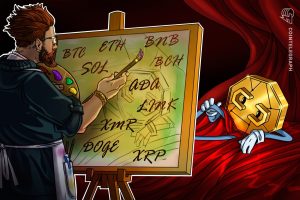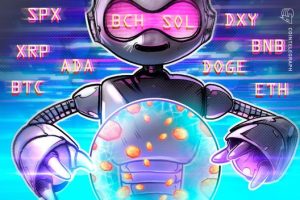In brief
Ava Labs has proposed moving Yuga Labs’ Otherside metaverse game and ApeCoin to Avalanche, an Ethereum competitor.
Other platforms, both within and outside the Ethereum ecosystem, are similarly looking to take on the Bored Ape ecosystem.
Last month’s launch of digital land plots for Yuga Labs’ Otherside—an upcoming Bored Ape Yacht Club metaverse game—marked a massive moment for the NFT market. It was also, by many accounts, a total disaster.
Even with the Otherdeeds yielding over $300 million in primary sales and pushing OpenSea to its best single all-time day of secondary trading, the mint process was widely panned for jacking up Ethereum gas fees—to the tune of $180 million spent in total. High-profile collectors described it as a “nightmare scenario” and called Yuga Labs’ response “tone deaf.”
As part of that response, Yuga Labs suggested that the budding ecosystem around ApeCoin (APE) should move from Ethereum’s mainnet to a dedicated blockchain to minimize fees for future drops. Some believe that an Ethereum scaling solution would be best, should the ApeCoin DAO—or decentralized autonomous organization—vote to pursue such a migration.
Ava Labs has another suggestion: What about Avalanche?
The core team behind Avalanche—a rival blockchain ecosystem to Ethereum—made its pitch earlier this week, sharing a proposal with the ApeCoin DAO. A DAO is an online community aligned around a common goal or opportunity, often with a token-based governance model. ApeCoin token holders can vote on decisions for the ecosystem.
Ava Labs’ plan would see Otherside and the ApeCoin ecosystem migrate to Avalanche, taking advantage of its speedier and cheaper transactions plus the network’s unique “subnets” feature that is ready-made for games.
“ApeCoin would be fantastic as an Avalanche subnet, and benefit from the superior performance of its dedicated chain on the fastest consensus protocol,” Ava Labs founder and CEO Emin Gün Sirer tweeted on Tuesday. “And the coin would have an additional use case that would help its market and regulatory stance.”
In an interview with Decrypt, Ava Labs Head of Strategy Phillip Liu and Head of Gaming Ed Chang described why they believe Avalanche is best suited to power the Bored Ape metaverse and the ApeCoin token, as well as how they see this potential process taking shape.
“In regards to the speed to get a network upright, Avalanche subnets is probably the one solution that can allow the Ape community to spin up their own custom network,” Liu told Decrypt, claiming that Avalanche is “the fastest with the most stable and reliable technology.”
Ava Labs’ proposal breaks down what the firm sees as potential advantages to bridging to Avalanche, ranging from its higher transaction throughput and lower fees to Avalanche’s support of the Ethereum Virtual Machine (EVM) to ease the transition process. Ava Labs has also offered technical support, potential funding, and marketing and educational initiatives.
Subnets are a unique feature of Avalanche that has been gaining momentum lately. Effectively, a subnet allows a project to have a dedicated space that is powered by the security of the Avalanche blockchain, yet acts like a bespoke, dedicated chain.
On a subnet, the wider activity (and potential congestion) of the Avalanche blockchain won’t affect the game or app—and likewise, a transaction-heavy game or app on a subnet won’t take resources away from Avalanche’s mainnet. Also, subnets can choose which token to use for gas fees, opening the door to ApeCoin to be used in this way if bridged to Avalanche.
ApeCoin is designed to power an entire ecosystem of games and apps beyond Otherside, which itself could prove to be a large-scale metaverse experience based on the popularity of the Bored Ape Yacht Club itself. Chang believes that a subnet is ideal for an expanding crypto gaming and entertainment ecosystem like that.
“They’re not just looking at building one game. They’re looking at building a whole platform,” he told Decrypt. “It seems like it would be a really good fit for what we’ve got here.”
Making the pitch
How this potentially proceeds forward is unclear, however. Yuga Labs tweeted after the Otherside mint that it would “encourage the DAO” to explore a move to a dedicated chain for ApeCoin. However, Otherside itself isn’t controlled by the ApeCoin DAO—that’s a Yuga Labs project that’s built around ApeCoin. Likewise, Yuga claims no control over the ApeCoin DAO.
Ava Labs’ proposal is primarily focused on Otherside, but if Yuga Labs ultimately wants to run the game on another blockchain or an Ethereum scaling decision, that decision won’t be made via the DAO’s token-based governance voting system.
Even so, Liu suggested that this proposal is a way to get people talking about the idea and obtain feedback about the proposal. Ava Labs has not yet communicated directly with Yuga Labs, as of now, but Liu and Chang told Decrypt that they’ve seen positive feedback from the Bored Ape community.
“Some of the conversations that have been generated and driven from this initial proposal, and folks we’ve met in the community, have been extremely productive,” said Chang. “We’re excited about continuing down this path.”
Avalanche isn’t the only blockchain platform that’s vying to onboard the Bored Ape community. This morning, Immutable X—a layer-2 scaling solution for Ethereum—issued its own proposal to the ApeCoin DAO, suggesting that it keep ApeCoin in the Ethereum ecosystem while providing benefits like IMX token grants, technical support, and more.
Keeping ApeCoin in the Ethereum world is clearly important to some APE backers, if the replies to Ava Labs’ proposal are any indication. Ethereum’s mainnet might not currently be ideal for high volumes of transactions around NFT drops and a metaverse world, but the Bored Ape Yacht Club began in the space—and Ethereum still has the highest-value NFT ecosystem.
Earlier this month, Ethereum sidechain scaling solution Polygon announced that it has integrated ApeCoin, making the token usable across Polygon-based apps. Polygon has yet to announce any larger-scale ambitions for a potential ApeCoin ecosystem bridging, however.
Flow is another non-Ethereum blockchain that might be vying for the ApeCoin DAO’s attention, too. Earlier this month, Dapper Labs co-founder and chief business officer Mik Naayem told CoinDesk that it had been in discussions with the DAO about proposing a move from Ethereum. Dapper created the Flow blockchain after running into scaling issues with CryptoKitties.
In any case, it could be an uphill battle for any blockchain platform to convince some Ethereum maximalists that an off-chain move is worthwhile and viable.
For Ava Labs and Avalanche, Chang said that education may be key, as people who are immersed in Ethereum may not understand Avalanche’s differences. However, he also said that they can “get creative” about bridging—such as only partially transitioning the ecosystem to Avalanche, and perhaps leaving some Bored Ape NFTs on Ethereum.
“It doesn’t necessarily need to be all-or-nothing right off the bat,” said Chang. “There are ways that we can work with the team to make this a graceful transition, if you will—including even the ETH maxis.”
Want to be a crypto expert? Get the best of Decrypt straight to your inbox.
Get the biggest crypto news stories + weekly roundups and more!
















